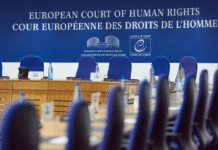Turkish President Recep Tayyip Erdoğan said in a live interview on pro-government NTV on Saturday that he might consider extraditing two jailed Greek soldiers if Greece were to return eight Turkish military personnel who were allegedly involved in a controversial military coup attempt in Turkey on July 15, 2016.
Erdoğan for the first time openly tied the fate of two jailed Greek soldiers to eight Turkish soldiers who fled to Greece immediately after the coup attempt in a military helicopter. Sgt Dimitris Kouklatzis, 27, and Lt Angelos Mitretodis, 25, were arrested at early March after reportedly being found in a “forbidden military zone” in Turkish territory. The soldiers said they strayed across the border after becoming lost in bad weather. They have been charged with espionage and put behind bars in Turkey.
“Greece asked us to give back the Greek soldiers, and we told them, ‘If you make such a demand, you should first give us the FETÖ soldiers involved in a coup against our state’,” Erdoğan told NTV, according to a report by French news agency AFP.
“FETÖ” is a derogatory term coined by the ruling Justice and Development Party (AKP) and President Erdoğan to refer to the Gülen movement.
“If they are handed over to us, we will consider” the situation of the Greek soldiers, Erdoğan said. Erdoğan on Saturday also said Greece had become the “first stop” for coup suspects who later flee to other European countries.
Erdoğan called for peace with Greece and referred to Greek Prime Minister Alexis Tsipras as a “young, dynamic” leader with a desire “to take a new step,’’ according to a report by Turkey’s state-run Anadolu news agency. “We need peace now. Besides, our peace with you is like no other,” Erdoğan was quoted as saying.
Erdoğan’s comments follow Turkish Justice Minister Abdulhamit Gül’s written message to his Greek counterpart, Stavros Kontonis, stating “Greece is becoming a gathering place for criminals” following a Greek court ruling releasing one of the eight Turkish soldiers who sought asylum in Greece.
The office of Prime Minister Tsipras issued a press release on Sunday describing Erdoğan’s proposal to exchange the two Greek soldiers for the eight Turkish servicemen “unacceptable,” Greek daily Kathimerini reported.
“Concerning reports of an exchange, or the equation of the issue of the two Greek soldiers with other issues, we emphasise once again that it is unacceptable and therefore rejected,” the press release said. The statement also noted that the Greek government would “keep” the positive elements of Erdoğan’s statement on Saturday regarding establishing peace in the Aegean and dialogue between the two countries.
Turkey has requested the eight men be sent back to face trial for allegedly taking part in the coup attempt. Thus far, three of Turkey’s requests to have the men extradited have been turned down as Greece continues to evaluate their asylum claims.
The biggest uncertainty regarding the relations between Turkey and Greece involves President Erdoğan and whether his ambitions are fuelling renewed claims to Greek isles, The New York Times (NYT) wrote on Saturday.
Relations between the two countries have been strained in recent months after Erdoğan called for renegotiation of the 1923 treaty demarcating the countries’ borders during his visit to Athens in December 2017. The natural gas resources in the eastern Mediterranean, Greece’s refusal to extradite eight Turkish soldiers and the arrest of two Greek soldiers by Turkish authorities in March after they crossed the border in bad weather as well as the dispute over Cyprus are among the reasons for high tensions in relations. Both countries engage in military show offs on the Aegean with their naval and air forces.
“The biggest uncertainty involves Turkey’s strongman president, Recep Tayyip Erdogan, and whether his ambitions are fueling renewed claims to these Greek isles — particularly after he embarked on Wednesday on an election campaign in which he is expected to play heavily on nationalistic sentiment,” the NYT said, adding that “analysts worry that the unpredictable nature of Mr. Erdogan makes the situation more volatile than ever between the countries.”
“Erdogan is a little bit out of control — he’s picking a lot of fights and there is a lot of uncertainty about how far he’s prepared to go,” said think tank researcher Nikos Tsafo. According to Tsafo “the odds of something going wrong are increasing on a weekly basis.”
“The potential for a military conflict between Greece and Turkey has never seemed as close since the 1990s,” Soner Çağaptay, director of the Turkish Research Program at the Washington Institute for Near East Policy, told the NYT.
Turkey survived a controversial military coup attempt on July 15, 2016 that killed 249 people. Immediately after the putsch, the Justice and Development Party (AKP) government along with President Recep Tayyip Erdoğan pinned the blame on the Gülen movement.
Fethullah Gülen, who inspired the movement, strongly denied having any role in the failed coup and called for an international investigation into it, but President Erdoğan — calling the coup attempt “a gift from God” — and the government initiated a widespread purge aimed at cleansing sympathizers of the movement from within state institutions, dehumanizing its popular figures and putting them in custody.
Turkey has suspended or dismissed more than 150,000 judges, teachers, police and civil servants since July 15. On December 13, 2017 the Justice Ministry announced that 169,013 people have been the subject of legal proceedings on coup charges since the failed coup.
Turkish Interior Minister Süleyman Soylu announced on April 18, 2018 that the Turkish government had jailed 77,081 people between July 15, 2016 and April 11, 2018 over alleged links to the Gülen movement.
















[…] Source link […]